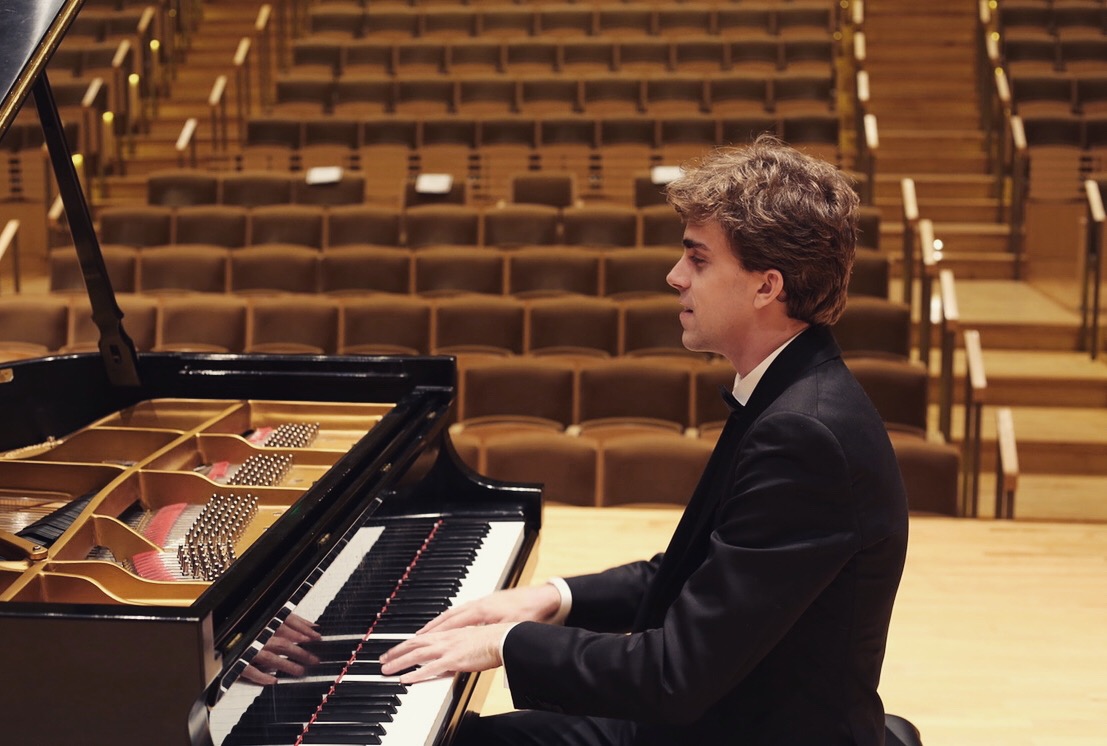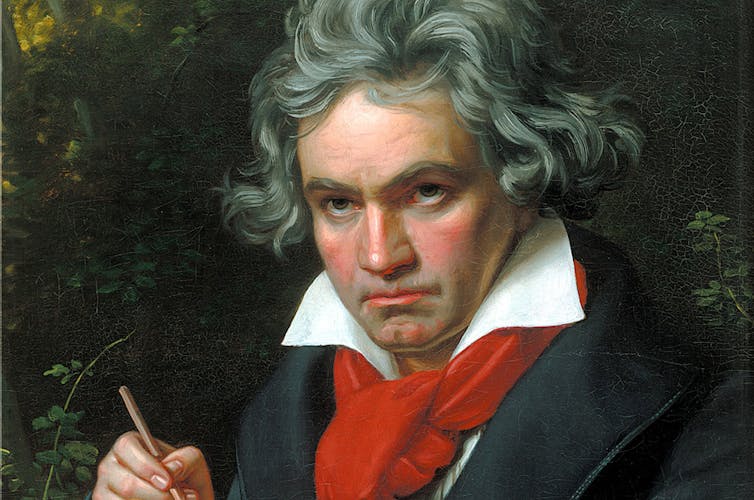Reed Tetzloff interview: “Let loose and fling the music”
The young tousle-haired pianist from the distant Minnesota, Reed Tetzloff, is building a performance career in the U.S. and Europe by steering a course through rare repertoire that is both challenging and attractive for the listener.
He has created a stir with his Concord Sonata by Charles Ives, a piece that he says must be played “totally unbridled – it cannot be played any other way”. When he programs it, he adds, he has “no choice but to let loose and fling the music out into the atmosphere, come what may”.
In this video he captures the mystery and the magic of the Ives masterpiece.
Tetzloff’s most recent CD, “Sounds of Transcendence” (CME International) includes the piano sonata A. 85 by the American Charles Tomlinson Griffes, fresh and exciting music expertly articulated by the young American. In his well-informed liner notes he describes Griffes’ music as “feverish, expressionistic and disturbing”. It is also highly appealing in today’s modern context, some hundred years after it was composed.
The CD contains a coherent program that descends from Griffes to five pieces by Scriabin, ending in a sensitive treatment of César Franck’s Prelude, Choral et Fugue, (FVW 21)
Tetzloff was a semifinalist in the XV International Tchaikovsky Competition in 2015, and he has now built a busy career on that achievement. He went on to win prizes at competitions in Beijing, Cincinnati, Cleveland and New York among others.
In our email question-and-answer discussion he explains his priorities as a musician and his attraction to a wide range of repertoire.

'Q. Which of your teachers have had the greatest influence on you?
A. I have been fortunate to work with dedicated and inspiring teachers, notably Pavlina Dokovska, the Piano Department Chair at the Mannes College of Music, the Manhattan conservatory where I studied from 2010 to 2016, earning my bachelor’s and master’s degrees in piano performance.
Q. Aren’t you from the American Midwest?
A. Yes, I worked with Paul Wirth for eight years in my home town near Minneapolis, starting at the age of ten. He and Mme. Dokovska had a holistic approach and cared for me far beyond the piano. That really informed my thinking about what it means to live life as an artist all of the time, not only in front of the instrument.
Q. Are there other teachers important to your development?
A. I was blessed with several other professors at Mannes: studying Schenkerian Analysis with Carl Schachter, music history and a Bach-intensive course with Fred Fehleisen, twentieth-century theory with Joel Lester, and fortepiano and historical performance with Audrey Axinn, among others. And there were so many others -- Eteri Andjaparidze, Richard Goode, Jerome Rose, Victor Rosenbaum, and Vladimir Valjarević. They all impacted me greatly. Recently, the pianist and writer Beth Levin has been a mentor and an inspiration.
Q. So many pianists suffer from narrow musical training. You seem to have a broader background.
A. Yes, what I received there was the sense of an endless quest for understanding the great music literature. I always had the feeling of exploring music on the deepest level and yet always sensing that there is a vista of greater understanding just out of my grasp.
Q. For example?
A. One of many experiences that sticks out was the day I heard Robert Cuckson (chair of the Techniques of Music department at Mannes) discuss Schenkerian graphs of the Adagio from Bruckner’s Sixth Symphony. I walked in thinking I was quite familiar with the piece, and walked out feeling I had actually known nothing about it! I fear that as time goes on, institutions may lose sight of the value of this kind of study, but I feel extremely fortunate to have benefited from it."
Q. Where does contemporary music fit in among your interests? Do you have contact with living composers?
I have some contact with living composers, and have greatly enjoyed working with Lowell Liebermann, for example. I have also frequently performed certain works by contemporary American composers including Elliott Carter, Conlon Nancarrow, Frederic Rzewski, and Aaron Jay Kernis. I am happy to program contemporary works that are well-crafted, interesting on a musical and psychological level, and that relate well to the rest of the program.
Q. Your new CD introduces the little-known Charles Tomlinson Griffes. Do you plan further exploration of his work?
A. To some extent, yes, but the sad thing is that much of his potential was cut short with his death in 1920 at the age of 35 from influenza, during the terrible pandemic. The sonata, certainly his most significant piano work, was written very soon before he died. He took a new and fascinating direction with this piece, and would have written so much more incredible music as he matured. It’s especially bittersweet to imagine the piano concerto he might have composed.
Q. Wasn’t he productive right up to this sonata?
A. Of course. Prior to the sonata, he was writing extremely vibrant, often exotic music in a post-Wagnerian style, which I’ve represented on my CD by including the solo piano version of the Pleasure Dome. The revised orchestral version of this piece may be Griffes’ most popular work. He was a remarkably colorful orchestrator and I hope my performance hinted at some that.
Q. And his earlier compositions?
A. He wrote short tone-poems for solo piano. One of these is “The White Peacock”, which is still occasionally played. These pieces are mostly written in a quasi-impressionistic style, and they earned him comparisons to Debussy and Scriabin. I suppose that further exploration of Griffes would take me in this direction.
Q. Do you delve into the world of 20th century music in general ?
A. Yes, beyond Griffes I’m very interested in early 20th century music in general. It was such a rich period, with everyone spinning off in countless directions as they reacted to Wagner and the end of the Romantic era. Griffes -- an American trained in Berlin -- is one of many examples that fascinate me.
Q. Are the three composers on your CD chosen to please the public or to please yourself?
A. I think it is some of both. I realize that some of my choices are not “popular repertoire” or typical audience-pleasers but I would not be satisfied with the program if I did not feel that it communicated a valuable message to the listener.
Q. Message? What do you mean? The turbulence seems to calm down pleasantly with the César Franck Prélude at the end…
A. Yes, I constructed a kind of “plot,” in fact: from a lot of psychologically turbulent music in Griffes and Scriabin to the hard-earned, major-key purification which comes only in the final pages of the Franck.
Q. Can you describe this journey?
A. The Griffes and Scriabin are also harmonically unsettled, based on strange and unique combinations of tones, neither major nor minor, with the sense of exploring esoteric worlds through an esoteric musical language. Franck’s writing is so extremely chromatic and Wagnerian. It is a very dark and solemn work, full of deeply Catholic symbolism of the crucifixion. Franck keeps the outcome in doubt and ratchets up the tension to a terrifying climax with all of the themes ringing out simultaneously -- and only after that can the music finally turn to B major and win its victory over death.
Q. It must be exhausting to perform live …
A. Yes, when I do, I’m always totally spent by the end, like I’ve finished an arduous journey. I hope that this album gives the listener some of that feeling as well.
Q. Outside of the CD, I have found your interpretation of the Charles Ives “Concord Sonata” to be impressive. Does this piece have special significance for you?
A. Indeed. It is one of those pieces that grabbed me and changed who I am as a musician and as a person -- it clarified many things that I want to achieve in everything that I play.
Q. It’s a wild piece of music, isn’t it?
A. Yes, it requires a state of utmost freedom -- totally unbridled. It can’t be played any other way. As soon as one starts trying to execute the score literally, it’s game over. Parts of it are basically unplayable as written, anyway, and Ives suggested that the score was a jumping-off point -- perhaps as if he didn’t want it always taken literally.
Q. What did this piece do to you as an artist?
A. First, Ives demands spiritual participation, that the performer become his own character in his world (and the world of Emerson, Hawthorne, the Alcotts, and Thoreau). In any case, as I worked on the piece, I felt like it was drawing expressive reserves out of me that I didn’t know I possessed. I had no choice but to let loose and fling the music out into the atmosphere, come what may.
Q. How do you make sense of it for the untrained listener?
The great challenge, both pianistically and mentally, is in drawing out the lyricism from such a thorny score: it is truly a beautiful, melodic, and deeply moving work. Ives’ music has an unmistakeable “truth” to it. He didn’t care about rules or what anyone thought of him. He was a red-blooded, baseball-loving boy from Connecticut who loved campfire songs and big band music, and who loved to sit down at the piano and muse on the eternal questions of life. That’s what a good performance of this piece should sound like, as if the pianist has been sitting in the wings reading Emerson’s essays, and then walks onstage in an exalted fervor and this music erupts out of the piano.
Q. You sometimes play this “thorny” music from memory – quite a feat.
A. Yes, I felt that I had to start playing it from memory to have the best chance of capturing these qualities. Of course, it can be intimidating to play from memory a 50-minute piece in Ives’ musical language, but I told myself that there’s no such thing as “getting lost” when one is creating the music on the spot.
Q. What are your career aims? Solo recitals? Ensemble playing?
A. I have been mainly focused on solo playing to this point, and will continue that -- I always love the thrill of playing a solo recital or as a concerto soloist with orchestra. However, this year the cellist Alexis Pia Gerlach and I formed a duo and will be performing together frequently going forward. Working with her has been revelatory -- I love chamber music but had had less-than-inspiring experiences playing in chamber groups. When I began playing with Alexis it was apparent that we were enhancing one another’s musicianship, crafting an interpretation together like iron sharpening iron. I have also had very inspiring experiences performing with the bass-baritone Mark S. Doss - I collaborated with him in his American recital tours in 2018 and 2019. In addition to being a world-class voice, he is the consummate dramatist: the way that he rhetorically communicates the meaning of a text always gives me much to think about and apply to everything I play.
END
This article is brought to you by the author who owns the copyright to the text.
Should you want to support the author’s creative work you can use the PayPal “Donate” button below.
Your donation is a transaction between you and the author. The proceeds go directly to the author’s PayPal account in full less PayPal’s commission.
Facts & Arts neither receives information about you, nor of your donation, nor does Facts & Arts receive a commission.
Facts & Arts does not pay the author, nor takes paid by the author, for the posting of the author's material on Facts & Arts. Facts & Arts finances its operations by selling advertising space.




















